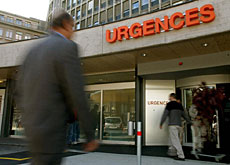Report halves number of illegal residents

The number of people living in Switzerland without proper authorisation is significantly lower than previously thought, according to a study.
The Bern-based Gfs Institute says that only around 90,000 people do not have a residence permit, half the lowest previous estimates.
The study – funded by the Federal Migration Office – found that there was no correlation between illegal residency and the number of asylum seekers whose applications had been turned down by the authorities.
Researchers said they were able to gain a more accurate picture of the situation by focusing on the labour market.
Many illegal residents were found to be living in high-income areas, not only in cities but also in rural areas.
In general, these individuals have jobs which demand they put in long hours for poor pay.
The majority are aged between 20 and 40 and are single.
Menial jobs
In urban areas, many women without the required papers work as cleaners in private households, whereas a majority of men have jobs on farms in the countryside.
The length of the average stay of such a person in Switzerland varies considerably from a few weeks to many years.
The findings are based on six case studies in the following cantons: Zurich, Basel City, Thurgau, Vaud, Geneva and Ticino.
The figures were then adjusted to estimate the total for the whole of Switzerland.
Experts agreed that the majority of these people were not engaged in criminal activities.
They also stated that the number of illegal residents could rise in the next few years.
swissinfo with agencies
According to the Gfs research institute, there are between 80,000 and 100,000 illegal residents in Switzerland.
Around 20,000 live in canton Zurich, another 5,000 in Basel, 12,000 to 15,000 in canton Vaud, 8,000 to 10,000 in Geneva and 2,000 in canton Ticino.
Between 60 and 80 per cent of these illegal residents are less than 40 years old.
More than half of them have no professional training.
The average monthly salary ranges between SFr1,000 ($843) and SFr2,000.

In compliance with the JTI standards
More: SWI swissinfo.ch certified by the Journalism Trust Initiative










You can find an overview of ongoing debates with our journalists here . Please join us!
If you want to start a conversation about a topic raised in this article or want to report factual errors, email us at english@swissinfo.ch.